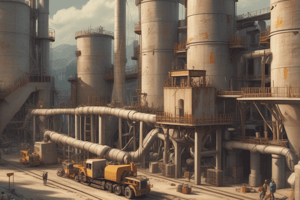Podcast
Questions and Answers
What is the main ingredient in Portland Cement that provides the source of calcium oxide?
What is the main ingredient in Portland Cement that provides the source of calcium oxide?
Limestone
What are the main types of manufacturing processes for cement?
What are the main types of manufacturing processes for cement?
- Intermediate process
- Dry process (correct)
- Wet process (correct)
- High temperature process
The initial setting time of cement is usually more than 10 hours.
The initial setting time of cement is usually more than 10 hours.
False (B)
What is the primary function of gypsum in Portland Cement?
What is the primary function of gypsum in Portland Cement?
What is the name of the cement that is specifically designed for construction that might be exposed to sulfate attack?
What is the name of the cement that is specifically designed for construction that might be exposed to sulfate attack?
What type of cement is known for its high strength and rapid hardening properties?
What type of cement is known for its high strength and rapid hardening properties?
What is the common name for the chemical compound CaO in Portland Cement?
What is the common name for the chemical compound CaO in Portland Cement?
What is the main characteristic of glass that enables it to be shaped into various forms?
What is the main characteristic of glass that enables it to be shaped into various forms?
Which of the following is NOT a raw material used in the production of glass?
Which of the following is NOT a raw material used in the production of glass?
What is the typical temperature at which glass is melted in a furnace during the glass manufacturing process?
What is the typical temperature at which glass is melted in a furnace during the glass manufacturing process?
Which type of glass is known for being both strong and resistant to fire?
Which type of glass is known for being both strong and resistant to fire?
What type of glass offers a high level of insulation and is often used for buildings?
What type of glass offers a high level of insulation and is often used for buildings?
Flashcards
Cement
Cement
A material with adhesive and cohesive properties that makes it capable of bonding minerals.
Portland Cement
Portland Cement
The most common type of cement used in construction.
Lime-containing materials
Lime-containing materials
The main source of calcium oxide (CaO) in cement.
Clay & clay-like materials
Clay & clay-like materials
Signup and view all the flashcards
Gypsum
Gypsum
Signup and view all the flashcards
Slag from blast furnaces
Slag from blast furnaces
Signup and view all the flashcards
Iron ore
Iron ore
Signup and view all the flashcards
Bauxite
Bauxite
Signup and view all the flashcards
Silica
Silica
Signup and view all the flashcards
Wet process
Wet process
Signup and view all the flashcards
Dry process
Dry process
Signup and view all the flashcards
Rotary kiln
Rotary kiln
Signup and view all the flashcards
Clinker
Clinker
Signup and view all the flashcards
Calcium Silicate (C2S)
Calcium Silicate (C2S)
Signup and view all the flashcards
Tricalcium silicate (C3S)
Tricalcium silicate (C3S)
Signup and view all the flashcards
Tricalcium aluminate (C3A)
Tricalcium aluminate (C3A)
Signup and view all the flashcards
Tetracalcium aluminoferrite (C4AF)
Tetracalcium aluminoferrite (C4AF)
Signup and view all the flashcards
Setting
Setting
Signup and view all the flashcards
Hardening
Hardening
Signup and view all the flashcards
Hydraulic Modulus
Hydraulic Modulus
Signup and view all the flashcards
Silica Modulus
Silica Modulus
Signup and view all the flashcards
Alumina Modulus
Alumina Modulus
Signup and view all the flashcards
Regular Portland Cement
Regular Portland Cement
Signup and view all the flashcards
Sulfate Resistance Portland Cement
Sulfate Resistance Portland Cement
Signup and view all the flashcards
Rapid Hardening Portland Cement
Rapid Hardening Portland Cement
Signup and view all the flashcards
Low Heat of Hydration Portland Cement
Low Heat of Hydration Portland Cement
Signup and view all the flashcards
White Portland Cement
White Portland Cement
Signup and view all the flashcards
High Alumina Cement
High Alumina Cement
Signup and view all the flashcards
Oil-well Cement
Oil-well Cement
Signup and view all the flashcards
Blended Cements
Blended Cements
Signup and view all the flashcards
Slag-rich Cement
Slag-rich Cement
Signup and view all the flashcards
Sand or Limestone Cement
Sand or Limestone Cement
Signup and view all the flashcards
Study Notes
Engineering Chemistry - Lecture: Building Materials
- Cement is a material with adhesive and cohesive properties, enabling it to bond minerals.
- Egyptians used lime and gypsum mortar for pyramids.
- Greeks used lime mortar.
- Romans produced cement from siliceous-aluminous volcanic ash material.
Cement Industry
-
Raw Materials:
- Limestone: primary source of calcium oxide
- Clay and clay-like materials: source of alumina and silica. These are also added from additional resources like slag, bauxite, iron ore, silica, and sand.
- Gypsum (2-3%): added to regulate setting time.
- Iron source
- Sand
-
Manufacturing Methods:
- Wet process: Grinding and mixing raw materials in water
- Dry process: Grinding and mixing dry raw materials
-
Process Description:
- Raw materials are mined, crushed, and transported
- Raw materials are mixed, preheated, and dried
- Clinker is prepared in a rotary kiln
- Clinker is mixed with gypsum
- Final product, cement, is then stored and packaged.
Cement Properties
-
Setting and Hardening
- Setting: Initial stiffening due to gel formation.
- Hardening: Mechanical strength development.
- The initial setting time is 45 minutes, and the final setting is 10 hours.
- Gypsum is added to regulate setting time to slow hydration and prevent very rapid setting.
-
Clinker Compositions
- Dicalcium silicate (C₂S)
- Tricalcium silicate (C₃S)
- Tricalcium aluminate (C₃A)
- Tetracalcium aluminoferrite (C₄AF)
Types of Cement
- Regular Portland cement: General construction use (not in soils or groundwater.)
- Sulfate resistant Portland cement: Used in construction exposed to sulfate attack.
- Rapid hardening Portland cement: For projects needing quick strength development.
- Low heat of hydration Portland cement: Low-heat of hydration, slower strength development, good for large structures.
- White Portland cement: White colored, no iron oxide.
- High alumina cement: Chemical resistance to corrosion.
- Oil-well cement: High C₂S and C₃S for low heat of hydration, coarser.
- Blended cements (Slag-rich, sand/limestone): Reduce cost, resistance to sulfates, chloride.
Glass
-
History:
- Glass production dates back thousands of years.
- Egyptians and other early civilizations valued glass.
- Modern glass production is efficient and productive.
-
Properties:
- Amorphous, inorganic, homogeneous, and transparent material.
- Can be molded into various shapes.
-
Manufacturing:
- Raw materials (sand, limestone, soda ash, etc.) are crushed and mixed.
- Mixed materials are melted in a furnace (typically 1500°C.)
- Molten glass is formed and cooled.
-
Types of Constructed Glass:
- Common flat glass: Windows, doors
- Float glass: Shopfronts, public places
- Shatterproof glass: Added plastic so it doesn't shatter into pieces.
- Laminated glass: Layers of glass with plastic interlayers.
- Tempered glass: Strong, for impact resistance
- Glass blocks: Walls, skylights.
- Glass wool, fiber glass, insulated glazed units.
Studying That Suits You
Use AI to generate personalized quizzes and flashcards to suit your learning preferences.





